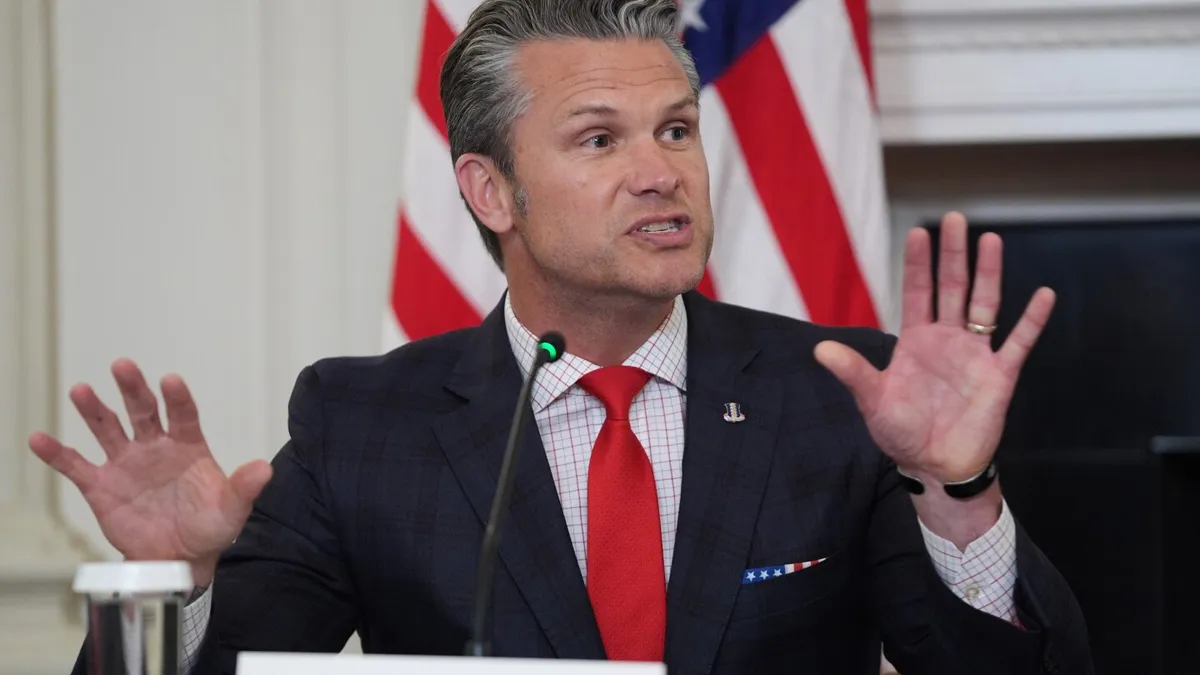
In a significant escalation of military action, the U.S. military has executed its 10th strike on a suspected drug-running vessel, resulting in the deaths of six individuals in the Caribbean Sea. This operation was announced by Defense Secretary Pete Hegseth on Friday, who attributed the vessel's operation to the notorious Tren de Aragua gang, a criminal organization that originated in a Venezuelan prison.
The latest strike, which occurred overnight, signifies a growing urgency in U.S. military operations against drug trafficking. Hegseth noted that this marks the second time the Trump administration has linked military actions directly to the Tren de Aragua gang. The frequency of these strikes has notably increased from one every few weeks to three within just this week, resulting in a total of at least 43 fatalities since September.
Recent actions have also expanded the operational area of the U.S. military, with two of the latest strikes targeting locations in the eastern Pacific Ocean. This shift aims to intercept the illicit cocaine trafficking routes from the world's largest cocaine producers.
A 20-second black and white video shared on social media captured the moment of the strike, showing a small boat seemingly stationary on the water before a projectile descends and triggers a significant explosion. The video concludes before the aftermath of the explosion can be assessed.
Hegseth emphasized that this strike occurred in international waters and highlighted that it was the first executed at night. “If you are a narco-terrorist smuggling drugs in our hemisphere, we will treat you like we treat Al-Qaeda,” he stated, reaffirming the U.S. commitment to tracking and eliminating drug traffickers.
This military action draws parallels to previous strikes announced last month, where the focus was also on the Tren de Aragua gang, which the Trump administration has categorized as a foreign terrorist organization. U.S. officials have asserted that this gang is at the heart of the violence and drug trafficking issues affecting various American cities. The administration has indicated that at least four of the targeted vessels originated from Venezuela.
The ongoing military operations and a significant buildup of U.S. forces in the Caribbean and off the Venezuelan coast have sparked speculation regarding potential intentions to destabilize the regime of Venezuelan President Nicolás Maduro, who is currently facing U.S. charges of narcoterrorism. Recently, the U.S. military deployed supersonic heavy bombers near Venezuela, adding to tensions in the region.
In response to U.S. military activities, President Maduro praised his security forces and civilian militias for conducting defense exercises along Venezuela's extensive coastline. He reported that in a six-hour period, they covered 100% of the country’s coastline, showcasing readiness against any potential U.S. attack.
Experts like Elizabeth Dickinson, a senior analyst at the International Crisis Group, suggest that the U.S. military presence may serve more as a message to regional countries than a direct fight against drug trafficking. Dickinson stated, “Drugs are the excuse,” indicating that the U.S. aims to pursue broader geopolitical objectives in the region.
Hegseth's recent statements have drawn a strong parallel between the current crackdown on drug traffickers and the U.S. war on terrorism initiated after the 9/11 attacks. President Trump has classified drug cartels as unlawful combatants, suggesting that the U.S. is in an "armed conflict" with these organizations, relying on legal frameworks similar to those used in the past.
When questioned about the possibility of Congress issuing a declaration of war against the cartels, Trump dismissed the idea, stating, “We’re going to kill people that are bringing drugs into our country.” His comments have sparked concern among lawmakers from both parties regarding the authority for military actions without congressional approval. Senator Andy Kim expressed apprehension about the potential escalation of military involvement.
In contrast, Republican Representative Mario Diaz-Balart expressed support for Trump's military strategy, stating, “It’s about time,” while acknowledging the president’s reluctance to engage in prolonged conflicts.
As tensions rise and military actions continue, the implications of these operations on regional stability and U.S. foreign policy remain to be seen.